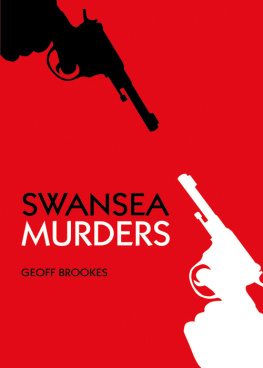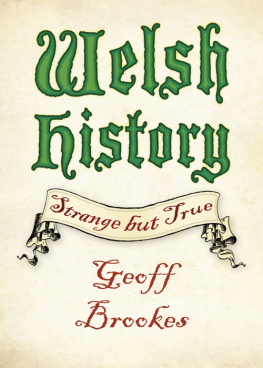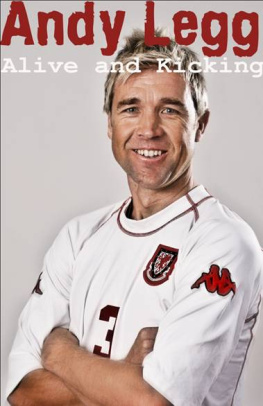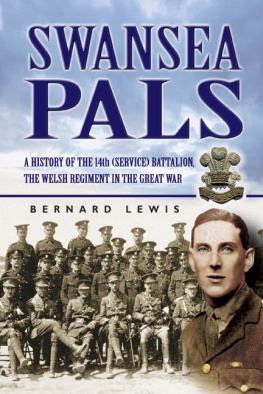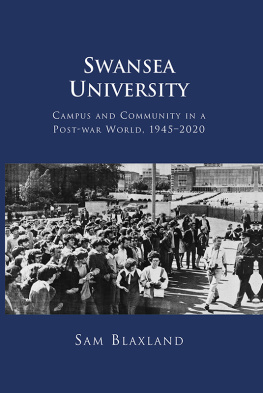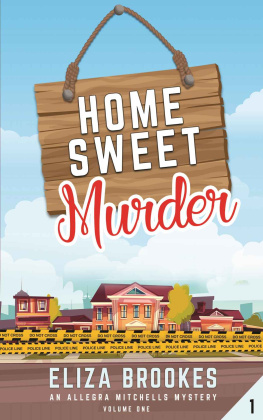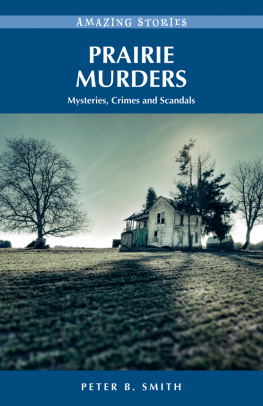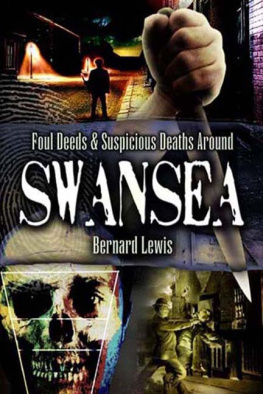To my mother, Eileen Brookes,
and my mother-in-law, Elaine Hoplain.
Thank you for everything, from all of us
CONTENTS
Swansea was such a seething hotbed of crime that this could never be an exhaustive guide to our troubled past. Some significant cases still remain unexplored, taunting me still. It is a shame they didnt quite make it, but a selection had to be made. But just a word to the perpetrators who might think they have got away with it by thus remaining unexposed. I know who you are.
The book has been compiled entirely from contemporary sources court records, original documents and newspapers. In this way I have been able to find a voice for our people; for as far as I know, the words I have given them to speak are their own, as reported at the time.
There are so many people I need to thank, without whom this volume would have remained a vague intention, rather than reality. My family and friends, as always, have been patient and understanding.
The willingness of friends to provide remarkable and original artwork has been very moving. You can see for yourself how good they are; thank you Charlotte Wood, Ditta Szalkai, Gill Figg and Angela Warne-Payne. To be honest I envy them their talent, though Gills facility with anonymous letters really should be brought to the attentions of the constabulary as a matter of some urgency.
Swansea Library and Swansea Archive have been as excellent and supportive as they always are. Liverpool Registry Office dealt with my request for Andrew Duncans death certificate professionally and efficiently. The tragic and moving conclusion to his story has never been published before, and I am humbled by the fact that, with the help of others, I have been able to find it.
The book has taken me further afield too. I received helpful support from Berkshire Archives in Reading, where I had the opportunity to look at the records from Broadmoor Hospital. The National Library in Aberystwyth is a wonderful place, and I had the enormous privilege of looking at original court documents from the eighteenth century. It was quite a thrill. The National Archive in Kew continues to astonish me. What a wonderful place. The story of poor Kate Jackson is merely an example of all those other silent stories that lie there, waiting patiently to be revealed.
Murder? Not a nice idea. And sometimes the piling up of madness on top of cruelty and anger has been hard to deal with. But in the end this book is about the people of Swansea. I could not have written it without the strenuous efforts made by our ancestors to get drunk and attack each other, often for what in retrospect seems to be no good reason. Without their commitment to drunkenness and idiocy, this book could never have been written.
Like so many other stories here, this started on a Saturday night in Swansea.
Why am I not surprised?
Morgan Mathews came from Cardiff and was described as County Fiddler an unusual title, which may imply that he had some kind of obligation to entertain, an important factor in this story. He had been lodging with Roger Rosser in the town for a couple of weeks. Sadly, his musical gifts do not seem to have nurtured a serene personality; he was known to be quarrelsome and to complain all the time.
On 18 October 1730 he was out drinking in John Reads public house with a crowd of men he didnt know. But he was convivial enough. He called for ale. It was approaching midnight and everyone was both lubricated and excitable.
But when Roger Landeg asked Morgan to play the fiddle, he seems to have refused, saying that he was not working, and anyway, he hadnt got his instrument with him. Landeg got stroppy and called him a fool and a villain, and probably worse. I mean, what was the point of a County Fiddler if he was not prepared to fiddle? His stepson-in-law, Nehemiah Rees from Llangyfelach, got involved too.
A fight was brewing and so the landlady threw them out. They went into the entry, where they fought in the dark. After a while they spilled on to the street. Here Rees started banging Mathews repeatedly on the head with the handle of his whip.
Roger Landeg was mightily impressed. God-a-mercy Miah! Well done, Miah! he cried. He was clearly impatient for the invention of rugby.
Soon Roger joined in, though his pals were keen to say that they had tried to stop him from doing so. Apparently family honour was at stake. And so he left Morgan Mathews with painful reminders of their family bond and traditions.
For his part Mathews, always ready to live the drama, cried out, I am murdered! I am murdered! Bring a light, for the Lords sake!
The fight was broken up. They took him to the brewhouse to wipe him down. He certainly seemed to have lost a lot of blood his clothes were soaked through.
When he staggered back to Rossers house the following morning he was covered in blood, with his handkerchief tied around his head, still concerned in liquor. He said that Landeg had killed him, which you might think was an exaggeration since he had just walked home. Morgan took to his bed, telling Rosser that he could have fought Rees on his own, no problem, but Landeg had tipped the balance and that wasnt fair. He had been lying on top of Rees, which had exposed him to Landegs brutal attentions. He had had a bit of a booting. If he had been underneath Rees it would have been better. As it was, he was beaten all over. He complained particularly about being kicked in the heart. He had contusions to the back and the scrotum.
I am murdered! I am murdered!
He went off on Monday to Mr Whitney the apothecary to have his wounds dressed. He was badly beaten, but his skull did not appear fractured. They met again on Tuesday in the market, when Mathews said he was improving, and he went to be treated again on Wednesday and Thursday.
He seemed to wander around for the rest of the week, complaining to whoever would listen. When asked by a neighbour, Jane Henry, if he forgave the perpetrators, he said he forgave their souls but wanted their bodies punished. He let everyone know that he would apply for a warrant for their arrest but that he would be ready to patch up any differences if they would give him a handsome treat and say they were sorry.
Mr Whitney later observed that the wounds were healing nicely. But this was 1730, and of course they had no way of knowing what was happening within, unseen.
Morgan Mathews was right. He had been mortally wounded.
Suddenly on Saturday, a week after the assault, he contracted a violent fever. Mr Whitney was called, along with the surgeon Rowland Richard. They found him delirious, and he had lost the power of speech. He declined rapidly and died on Sunday at 2 p.m. Perhaps there was a haemorrhage of some kind; a clot; a fracture. But unless he had been beaten again on his way home that night, then it was clear who had done it.
A prosecution was brought by Anne, Morgan Mathews wife. Rees and Landeg were arrested, though the latter died in prison whilst awaiting trial. Rees pleaded not guilty of murder but was found guilty of manslaughter. The medical evidence suggested that the wounds had contributed to Mathews death, but they were not the direct cause. He had died of a fever of some kind. Perhaps it would have happened without him being involved in a fight. Rees, for his part, prayed benefit of clergy. This was sometimes used in manslaughter cases to mitigate a possible death sentence. Originally the condemned had to read from the Bible to indicate a level of scholarship, but since psalms could be memorised, that requirement had been dropped. The condemned would be burnt or branded on the thumb. It was an option you could only choose once. When you appeared in court, you would have to flash your thumb to show that you didnt have any previous, as they say. A bit like having points on your licence, I suppose. And no matter how painful it would have been to have been clamped down and burnt with a red-hot iron, and then in Rees case to face six months hard labour, it was better than the alternative.
Next page
